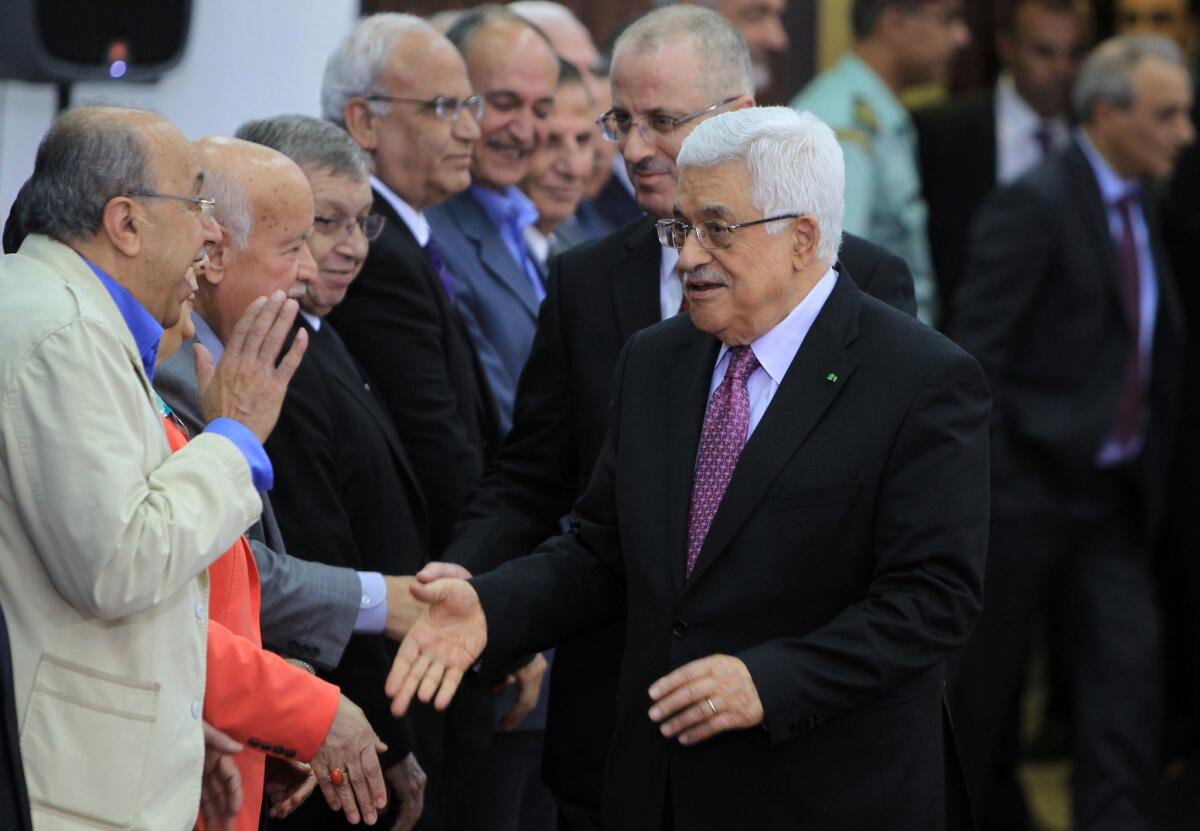New Palestinian government backed by Hamas; Israel threatens sanctions

Palestinian Authority President Mahmoud Abbas swore in a new interim government Monday following an agreement with his archrival, the Islamist Hamas movement, to reunify their ranks after seven years of division.
Israel opposed the creation of the unity government because it is backed by Hamas, which Israel considers a terrorist organization. Israeli officials threatened to impose sanctions on the Palestinian Authority.
------------
FOR THE RECORD
The headline on an earlier version of this post said the new government “included” Hamas. The Palestinian Authority says the new government is nonpartisan and includes no ministers who formally belong to any political party.
------------
Abbas said in a pre-recorded speech aired on official Palestinian TV after the swearing-in ceremony that the new government -- composed of 17 ministers who do not belong to any political party, including the incumbent prime minister, Rami Hamdallah -- will not be responsible for political negotiations but only for preparing for national elections and running daily life in the Palestinian areas.
“Today, with the formation of the national conciliation government, we declare the end of division that caused our national cause catastrophic damage in the past seven years,” said Abbas.
Hamas took over the Gaza Strip after a battle with Abbas’ forces in June 2007 and set up its own government in the coastal area while Abbas kept rule of the West Bank.
“The government, which will start its work today, is an interim government and its job is to prepare for elections in the near future and to take care of the needs of our people,” said Abbas.
He promised that it would “abide by the commitments of the [Palestinian] Authority, its signed agreements and its political platform,” adding that “political negotiations will remain under the authority of the Palestine Liberation Organization, the sole legitimate representative of the Palestinian people, and the government will have nothing to do with this.”
In response to the formation of the new government, the Israeli security Cabinet held an urgent meeting Monday afternoon. After a 2 1/2-hour discussion, the Cabinet unanimously agreed “to not negotiate with a Palestinian government that relies on Hamas, a terrorist organization which calls for the destruction of Israel.”
It also decided to authorize Prime Minister Benjamin Netanyahu to impose additional sanctions on the Palestinian Authority and “to hold the Palestinian Authority responsible for all actions that harm the security of Israel” if they originate in the West Bank or Gaza Strip.
Referring to Abbas by his nickname, Netanyahu said: “Today, Abu Mazen said yes to terrorism and no to peace. This is the direct continuation of Abu Mazen’s policy of refusing peace.”
He said that “the agreement with Hamas makes Abu Mazen directly responsible for the terrorism emanating from Gaza,” adding that “the state of Israel will not conduct diplomatic negotiations with a Palestinian government that is backed by Hamas, a terrorist organization that calls for the destruction of Israel.”
Abbas said that although several countries, including the European Union, Russia and, to some extent, the United States, have welcomed the new government, Israel stood against it.
“The Israeli statements against the reconciliation agreement and the threats of sanction against the new government, the Palestinian Authority and our people make us even more determined to hold on to what we have achieved,” he said.
U.S. Secretary of State John Kerry, speaking to Abbas by phone Sunday, “expressed concern about Hamas’ role in any such government and the importance that the new government commit to the principles of nonviolence, recognition of the state of Israel and acceptance of previous agreements with it,” State Department spokeswoman Jen Psaki said in a statement.
Kerry said the United States would “judge any government based on its composition, policies and actions,” Psaki said.
Psaki said U.S. officials intended to work with the new government and continue providing U.S. aid, “but we’ll be watching closely to ensure that it upholds the principles that President Abbas reiterated today.”
Palestinians welcomed the U.S position. Abbas spokesman Nabil Abu Rudeineh described it as “a message to the government of Israel and the international community that the Palestinian position is consistent with international decisions and law,” according to the official news agency WAFA.
“Israel should understand that the world is changing and therefore it should stop all its measures in order to create the proper atmosphere to preserve whatever is left of the peace process,” Abu Rudeineh added.
In a statement attributed to unidentified government officials, the Israeli government said it was “deeply disappointed” by the State Department’s comments.
“If the U.S. administration wants to advance peace, it should be calling on Abbas to end his pact with Hamas and return to peace talks with Israel,” the statement said.
Abbas warned that “any measure by Israel that may harm the interest of our Palestinian people will not go by without a proper response from our side. We are not interested in an escalation or more tension, but we will not stand by with our hands tied in front of collective punitive measures and we will use political, diplomatic and legal means to respond.”
The outgoing leader of Hamas in Gaza, Ismail Haniyeh, who has served as Hamas’ prime minister since the takeover of Gaza, welcomed the new unity government. He called its formation “a historical day we achieved together for the sake of our people and cause.”
Speaking at a news conference, he said, “We closed seven long years of division and opened a door for stability and participation in the decision-making process.”
Haniyeh said Hamas wanted Palestinians to have a “united voice,” adding, “We gave up the government willingly and with understanding of our national responsibility as we face the next stage [of] unity, partnership and resistance.”
Four of the new Cabinet ministers from the Gaza Strip were not present at the swearing-in ceremony in Ramallah because Israel refused to allow them to travel through its territory -- the first sign of Israeli sanctions against the new government.
Special correspondents Abukhater and Sobelman reported from Ramallah and Jerusalem, respectively.
More to Read
Sign up for Essential California
The most important California stories and recommendations in your inbox every morning.
You may occasionally receive promotional content from the Los Angeles Times.










